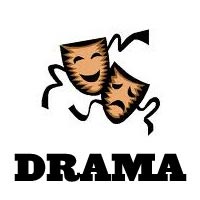History-Related Dramas:
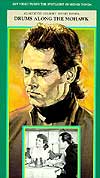 Films
that have dramatized portions of the American past include W.S. Van Dyke's San Francisco (1936) on the eve of the 1906 quake, John Ford's Drums
Along the Mohawk (1939) with Claudette Colbert and Henry Fonda facing
marauding Indian attacks at the time of American independence, Howard Hawks' Sergeant York (1941) with Gary Cooper as the gentle hick-hero of the
WWI trenches, the gothic drama of a turn of the century family in Orson Welles' The Magnificent Ambersons (1942), and of course Gone With The Wind (1939) during the Civil War and Reconstruction
Eras. Exquisite, nostalgic family dramas include John Ford's How
Green Was My Valley (1941) - a flashback of Roddy McDowall's childhood
in a Welsh mining village, and George Stevens' tribute to a Norwegian immigrant
mother (Irene Dunne) raising her family in San Francisco in I
Remember Mama (1948). Films
that have dramatized portions of the American past include W.S. Van Dyke's San Francisco (1936) on the eve of the 1906 quake, John Ford's Drums
Along the Mohawk (1939) with Claudette Colbert and Henry Fonda facing
marauding Indian attacks at the time of American independence, Howard Hawks' Sergeant York (1941) with Gary Cooper as the gentle hick-hero of the
WWI trenches, the gothic drama of a turn of the century family in Orson Welles' The Magnificent Ambersons (1942), and of course Gone With The Wind (1939) during the Civil War and Reconstruction
Eras. Exquisite, nostalgic family dramas include John Ford's How
Green Was My Valley (1941) - a flashback of Roddy McDowall's childhood
in a Welsh mining village, and George Stevens' tribute to a Norwegian immigrant
mother (Irene Dunne) raising her family in San Francisco in I
Remember Mama (1948).
Sports Dramas:
Dramatic sports films or biographies have created memorable portraits
of all-American sports heroes, individual athletes, or teams who are faced
with tough odds in a championship match, race or large-scale sporting event,
soul-searching or physical/psychological injuries, or romantic sub-plot distractions.
Fictional sports films normally present a single sport (the most common being
baseball, football, basketball, and boxing), and include the training and
rise (and/or fall) of the underdog or champion in the world of sports.
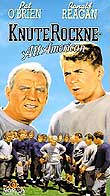 Typical
sports films (with biographical elements) include the sentimental
biography of the Notre Dame football coach, Lloyd Bacon's Knute
Rockne: All-American (1940). One of the best films ever
made about pro-football was Ted Kotcheff's North Dallas Forty
(1979) which examined
the brutal fact of labor abuses and drug use in professional football
- loosely basing its story on the championship Dallas Cowboys team.
The tearjerking made-for-TV sports film Brian's Song (1970) used
professional football as the backdrop for its sad tale of the death
of a Chicago Bears running back (James Caan). Burt Reynolds starred
in The Longest Yard (1974) as scandalized
ex-professional football quarterback Paul Crewe in prison who must
organize a team of convicts to challenge a prison-guard team (and
then face the additional challenge of throwing the game). In All
the Right Moves (1983), a young Tom Cruise took the role of
HS footballer "Stef" Djordjevic, who was struggling to
escape his life in a poor western Pennsylvania mill-town by winning
a sports scholarship. Recently, Cameron Crowe's sports romance-drama Jerry
Maguire (1996),
famous for the phrase "Show me the money!",
starred Tom Cruise as a hard-driven major sports agent, and Academy
Award-winning Cuba Gooding, Jr. as a football player. Typical
sports films (with biographical elements) include the sentimental
biography of the Notre Dame football coach, Lloyd Bacon's Knute
Rockne: All-American (1940). One of the best films ever
made about pro-football was Ted Kotcheff's North Dallas Forty
(1979) which examined
the brutal fact of labor abuses and drug use in professional football
- loosely basing its story on the championship Dallas Cowboys team.
The tearjerking made-for-TV sports film Brian's Song (1970) used
professional football as the backdrop for its sad tale of the death
of a Chicago Bears running back (James Caan). Burt Reynolds starred
in The Longest Yard (1974) as scandalized
ex-professional football quarterback Paul Crewe in prison who must
organize a team of convicts to challenge a prison-guard team (and
then face the additional challenge of throwing the game). In All
the Right Moves (1983), a young Tom Cruise took the role of
HS footballer "Stef" Djordjevic, who was struggling to
escape his life in a poor western Pennsylvania mill-town by winning
a sports scholarship. Recently, Cameron Crowe's sports romance-drama Jerry
Maguire (1996),
famous for the phrase "Show me the money!",
starred Tom Cruise as a hard-driven major sports agent, and Academy
Award-winning Cuba Gooding, Jr. as a football player.
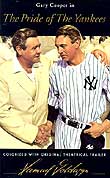 One
of the best sports biopics was Sam Wood's The Pride of the Yankees
(1942) with Gary Cooper in a fine performance as New York Yankees
great Lou Gehrig. In The Jackie Robinson Story (1950), the
famed black player who crossed the major-league 'color-line' and
joined the Brooklyn Dodgers portrayed himself. Director Barry Levinson's
mythical and romanticized film about baseball titled The Natural
(1984) featured
Robert Redford as Roy Hobbs - a gifted baseball player who had a fairy-tale
comeback and led his New York team to the World Series. Ron Shelton,
who was an actual ex-minor leaguer, wrote and directed the intelligent
comedy/drama Bull
Durham (1988) which used as its backdrop minor league baseball
to tell the story of a baseball groupie (Susan Sarandon), a veteran
catcher (Kevin Costner) and a dim-witted pitcher named Nuke LaLoosh
(Tim Robbins). The immensely popular fantasy/drama Field
of Dreams (1989) concerned the creation of a ball diamond
in the middle of an Iowa cornfield by a farmer (Kevin Costner). Writer/director
John Sayles' Eight
Men Out (1988) dramatized the infamous episode in professional
baseball of the scandalous 1919 World Series that was fixed - with
its final sepia-toned shots of banned ball-player "Shoeless" Joe
Jackson (D.B. Sweeney) in the minors. And Tommy Lee Jones starred
as the legendary baseball great Ty Cobb in Shelton's Cobb (1994). One
of the best sports biopics was Sam Wood's The Pride of the Yankees
(1942) with Gary Cooper in a fine performance as New York Yankees
great Lou Gehrig. In The Jackie Robinson Story (1950), the
famed black player who crossed the major-league 'color-line' and
joined the Brooklyn Dodgers portrayed himself. Director Barry Levinson's
mythical and romanticized film about baseball titled The Natural
(1984) featured
Robert Redford as Roy Hobbs - a gifted baseball player who had a fairy-tale
comeback and led his New York team to the World Series. Ron Shelton,
who was an actual ex-minor leaguer, wrote and directed the intelligent
comedy/drama Bull
Durham (1988) which used as its backdrop minor league baseball
to tell the story of a baseball groupie (Susan Sarandon), a veteran
catcher (Kevin Costner) and a dim-witted pitcher named Nuke LaLoosh
(Tim Robbins). The immensely popular fantasy/drama Field
of Dreams (1989) concerned the creation of a ball diamond
in the middle of an Iowa cornfield by a farmer (Kevin Costner). Writer/director
John Sayles' Eight
Men Out (1988) dramatized the infamous episode in professional
baseball of the scandalous 1919 World Series that was fixed - with
its final sepia-toned shots of banned ball-player "Shoeless" Joe
Jackson (D.B. Sweeney) in the minors. And Tommy Lee Jones starred
as the legendary baseball great Ty Cobb in Shelton's Cobb (1994).
Basketball-related sports dramas are rare: three notable ones
were Spike Lee's He Got Game (1998) with Denzel Washington as the convict
father of a promising basketball athlete, David Anspaugh's Hoosiers (1986) about an underdog 50s basketball team (coached by Gene Hackman) that won the
state championship, and Ron Shelton's play-filled, trash-talking court action
film White Men Can't Jump (1992) with its two basketball hustlers/con-artists
(Woody Harrelson and Wesley Snipes) and their scenes of two-on-two tournaments.
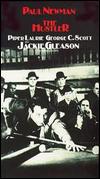 Kevin
Costner portrayed a talented pro golfer in Ron Shelton's romantic
sports film Tin Cup (1996). And Paul Newman portrayed swaggering,
upstart poolshark gambler Fast Eddie Felson in The
Hustler (1961) in the world of professional pool, shooting
against the great champ Minnesota Fats (Jackie Gleason). (Director
Martin Scorsese's sequel The Color of Money (1986) starred
Paul Newman reprising his role as "Fast Eddie", and Tom Cruise as
young hustler protégé Vincent Lauria.) Downhill
Racer (1969) starred
Robert Redford as an American downhill skier training to become an
Olympic superstar. The Best Picture winner Chariots of Fire (1981) told
the parallel stories of two English runners (one a devout Protestant,
the other Jewish) competing in the 1924 Paris Olympics. Autoracing
in the Daytona 500 was featured in the action/drama Days of Thunder
(1990). And one of the most memorable
ice hockey films was Slap Shot (1977), with Paul Newman as inspiring
player-coach Reg Dunlop of a minor-league team. Although a comedy, Caddyshack
(1980) was about an elitist country club for golf, a mischievous
green-destroying gopher, and a crazed groundskeeper (Bill Murray). Kevin
Costner portrayed a talented pro golfer in Ron Shelton's romantic
sports film Tin Cup (1996). And Paul Newman portrayed swaggering,
upstart poolshark gambler Fast Eddie Felson in The
Hustler (1961) in the world of professional pool, shooting
against the great champ Minnesota Fats (Jackie Gleason). (Director
Martin Scorsese's sequel The Color of Money (1986) starred
Paul Newman reprising his role as "Fast Eddie", and Tom Cruise as
young hustler protégé Vincent Lauria.) Downhill
Racer (1969) starred
Robert Redford as an American downhill skier training to become an
Olympic superstar. The Best Picture winner Chariots of Fire (1981) told
the parallel stories of two English runners (one a devout Protestant,
the other Jewish) competing in the 1924 Paris Olympics. Autoracing
in the Daytona 500 was featured in the action/drama Days of Thunder
(1990). And one of the most memorable
ice hockey films was Slap Shot (1977), with Paul Newman as inspiring
player-coach Reg Dunlop of a minor-league team. Although a comedy, Caddyshack
(1980) was about an elitist country club for golf, a mischievous
green-destroying gopher, and a crazed groundskeeper (Bill Murray).
Films
about boxing are perhaps the most numerous sub-genre. One of the best boxing
films ever made, along with Robert Wise's classic film noirish The Set-Up
(1949) starring Robert Ryan as aging boxer Stoker Thompson, was the realistically
stark Body and Soul (1947). It starred John Garfield as boxer Charlie
Davis who 'sold his soul' to unethical promoters but then had a change of
heart in the last three rounds of a championship fight during which he was
supposed to take a dive.
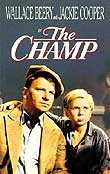 Others included King Vidor's classic The Champ (1931),
an award-winning story of a prizefighter and his young son, Champion (1949) with Kirk Douglas as the young fighter, the brutal boxing drama The Harder
They Fall (1956) (Humphrey Bogart's underrated last film in which he portrayed
Eddie Willis - an aging, crooked sportswriter), Ralph Nelson's Requiem
for a Heavyweight (1962) with Anthony Quinn as punch-drunk, washed-up
professional boxer Louis 'Mountain' Rivera, Martin Ritt's The Great White
Hope (1970) with James Earl Jones as black boxer Jack Jefferson, and Karyn
Kusama's independent feminist film Girlfight (2000) with a great performance
by Michelle Rodriguez as a struggling Brooklynite and teenage Latino boxer. Others included King Vidor's classic The Champ (1931),
an award-winning story of a prizefighter and his young son, Champion (1949) with Kirk Douglas as the young fighter, the brutal boxing drama The Harder
They Fall (1956) (Humphrey Bogart's underrated last film in which he portrayed
Eddie Willis - an aging, crooked sportswriter), Ralph Nelson's Requiem
for a Heavyweight (1962) with Anthony Quinn as punch-drunk, washed-up
professional boxer Louis 'Mountain' Rivera, Martin Ritt's The Great White
Hope (1970) with James Earl Jones as black boxer Jack Jefferson, and Karyn
Kusama's independent feminist film Girlfight (2000) with a great performance
by Michelle Rodriguez as a struggling Brooklynite and teenage Latino boxer.
One of the best films of the 80s decade, Raging
Bull (1980) was Martin Scorsese's tough, visceral and
uncompromising biopic film of the rise and fall of prizefighter
Jake La Motta with a remarkable performance by actor Robert
DeNiro. The stylized scenes in the ring included flying blood
and sweat, exaggerated flashbulb camera flashes, slow-motion
and violent punching sounds. The all-American
fictional, underdog Philadelphia boxing hero Rocky Balboa in
the populist, feel-good, Oscar-winning drama Rocky
(1976) series emerged
as the peak boxing-film series, followed by numerous sequels (and
a spin-off):
Best Director-winning Clint Eastwood's Best
Picture-winning sports drama Million
Dollar Baby (2004) told about a grizzled boxing trainer (Eastwood
as Frankie Dunn) who reluctantly coached determined Ozark Missouri
waitress "Maggie" Fitzgerald
(Best Actress-winning Hilary Swank) to a major welterweight championship
fight, but she tragically suffered a debilitating injury - and requested
that Frankie help assist in her suicide in the tearjerking conclusion.
Religious Dramas:
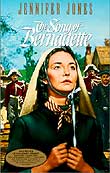 Religious
dramas (other than those considered in the epics genre)
that have demonstrated the redemptive power of faith and spirituality
include Frank Capra's The Miracle Woman (1932) with Barbara
Stanwyck as successful evangelist/miracle-worker Florence "Faith" Fallon,
and Henry King's The Song of Bernadette (1943) - the story
of a mid-19th century French peasant girl (Jennifer Jones) who
had a vision of the Virgin Mary in a grotto at Lourdes (France).
A similarly-themed film was The Miracle Of Our
Lady Of Fatima (1952) set in Portugal during World War I. William
Wyler's Friendly Persuasion (1956) was about
the peaceful Birdwell family - farmers living in Indiana (headed
by patriarch Jess Birdwell (Gary Cooper)). Their non-violent ideals
and Quaker upbringing came into conflict with non-pacifist behavior
that was required during the threatening Civil War struggle. Audrey
Hepburn starred as a WWII-era devoted nun serving in the Congo and
Belgium in Fred Zinnemann's The
Nun's Story (1959),
and Burt Lancaster gave a memorable
performance as Elmer
Gantry (1960), a phony, Bible-thumping,
fire and brimstone preacher. Religious
dramas (other than those considered in the epics genre)
that have demonstrated the redemptive power of faith and spirituality
include Frank Capra's The Miracle Woman (1932) with Barbara
Stanwyck as successful evangelist/miracle-worker Florence "Faith" Fallon,
and Henry King's The Song of Bernadette (1943) - the story
of a mid-19th century French peasant girl (Jennifer Jones) who
had a vision of the Virgin Mary in a grotto at Lourdes (France).
A similarly-themed film was The Miracle Of Our
Lady Of Fatima (1952) set in Portugal during World War I. William
Wyler's Friendly Persuasion (1956) was about
the peaceful Birdwell family - farmers living in Indiana (headed
by patriarch Jess Birdwell (Gary Cooper)). Their non-violent ideals
and Quaker upbringing came into conflict with non-pacifist behavior
that was required during the threatening Civil War struggle. Audrey
Hepburn starred as a WWII-era devoted nun serving in the Congo and
Belgium in Fred Zinnemann's The
Nun's Story (1959),
and Burt Lancaster gave a memorable
performance as Elmer
Gantry (1960), a phony, Bible-thumping,
fire and brimstone preacher.
Director Michael Anderson's far-fetched The
Shoes of the Fisherman (1968) was based on Morris L. West's 1963
best-seller, a fictionalized account about a political prisoner (a
Ukranian archbishop named Kiril Pavlovich Lakota (Anthony Quinn))
pardoned by the Soviet Union's Premier (Laurence Olivier) (the Premier
was his former jailer Piotr Ilyich Kamenev), after spending
20 years in a Siberian labor camp during the Cold War. He was released
to Rome and the Vatican where he became a Cardinal, and was unexpectedly
elected the next Catholic Pope (somewhat like real life's 1978 election
of Poland's Karol Wojtyla as John Paul II), named Pope Kiril.
Recently, Doubt (2008) (with
four Oscar nominations for acting), which was set
in the mid-1960s in a Bronx Catholic church, told
about a battle of wills between liberal Father Flynn (Philip Seymour
Hoffman) and the strict, iron-fisted parish school Principal Sister
Aloysius Beauvier (Meryl Streep). When one of the naive and innocent
teachers, Sister James (Amy Adams), reported her suspicions to Sister
Aloysius after viewing misconduct. She questioned an inappropriate
relationship between Father Flynn and the school's first black student,
troubled altar boy Donald Miller (revealed to be homosexual and the
victim of abuse), and thus set in motion a no-holds-barred crusade
by Sister Aloysius to oust Flynn.
Show-Business Dramas:
Hollywood (or Broadway) has also portrayed its own
inner workings of stage and screen. A number of biting dramas have
pictured the world of performance and the creative/artistic process,
often from behind-the-scenes. The focus of some "show-business" films
are on individual artists or groups who experience torment, frustration,
or difficulty. One of the earliest silent films (a comedy), Buster
Keaton's Sherlock, Jr. (1924) -
a film in a film, was the fanciful tale of a projectionist who
miraculously found himself as a sleuth-detective inside the film
he was screening.
 The
brilliant, classic film of the behind-the scenes world of the New York theater
and its grande dame (Bette Davis) and the duplicity of a brash and ambitious
newcomer was the subject of the award-winning All About Eve (1950) from writer/director Joseph Mankiewicz. [This
was the film in which Marilyn Monroe portrayed her own stereotype - a dumb
blonde.] Another 1950 movie, Billy Wilder's gothic noirish Sunset Boulevard (1950) illustrated the savage excesses of Hollywood
in a story featuring a faded and tragic silent film star Norma Desmond (Gloria
Swanson) and her out-of-work screenwriter (William Holden). Vincente Minnelli's The Bad and the Beautiful (1952) also indicted
Hollywood film-making in a story of an unscrupulous Hollywood producer, portrayed
by Kirk Douglas, who exploited a director, an actress, and a screenwriter.
Robert Altman's classic but unorthodox Nashville (1975) examined the business world of country-western
music through the private lives of its large ensemble cast brought together
to attend a political rally. Altman's later dark comedy with over 60 star
cameos, The Player (1992) savagely criticized the motion-picture industry
in a story about a disreputable studio executive (Tim Robbins). The
brilliant, classic film of the behind-the scenes world of the New York theater
and its grande dame (Bette Davis) and the duplicity of a brash and ambitious
newcomer was the subject of the award-winning All About Eve (1950) from writer/director Joseph Mankiewicz. [This
was the film in which Marilyn Monroe portrayed her own stereotype - a dumb
blonde.] Another 1950 movie, Billy Wilder's gothic noirish Sunset Boulevard (1950) illustrated the savage excesses of Hollywood
in a story featuring a faded and tragic silent film star Norma Desmond (Gloria
Swanson) and her out-of-work screenwriter (William Holden). Vincente Minnelli's The Bad and the Beautiful (1952) also indicted
Hollywood film-making in a story of an unscrupulous Hollywood producer, portrayed
by Kirk Douglas, who exploited a director, an actress, and a screenwriter.
Robert Altman's classic but unorthodox Nashville (1975) examined the business world of country-western
music through the private lives of its large ensemble cast brought together
to attend a political rally. Altman's later dark comedy with over 60 star
cameos, The Player (1992) savagely criticized the motion-picture industry
in a story about a disreputable studio executive (Tim Robbins).
Producer/director Richard Rush's The Stunt Man (1980) presented Peter O'Toole as a manipulative, power-hungry, megalomaniacal film
director. The Coen Brothers' dark, surreal and original comedy/drama Barton
Fink (1991) showed the strain on a New York playwright working on a simple
B-movie script in a seedy Hollywood hotel in the 1940s. Director Tom DiCillo's
low-budget independent sleeper film Living in Oblivion (1995) illustrated
the kinds of blundering, chaotic disasters that can occur during low-budget
filmmaking on a set. Director Robert Redford's Quiz Show (1994) portrayed
the scandal involving two "Twenty One" NBC TV quiz show contestants
involved in the fixed show that was sponsored by Geritol: WASP cheater Charles
Van Doren (Ralph Fiennes) and Queens-living Jew Herbie Stempel (John Turturro).
Literature-Related Dramas:
Literary works, plays, memoirs or diaries, poems, or novels
have often been adapted to provide the content for a number of excellent dramatic
films. Louisa May Alcott, Jane Austen, the Brontes, Pearl Buck, James Fenimore
Cooper, Joseph Conrad, Charles Dickens, Fyodor Dostoyevski, Theodore Dreiser,
Alexandre Dumas, William Faulkner, Edna Ferber, F. Scott Fitzgerald, Henry
James, John Grisham, Nathaniel Hawthorne, Victor Hugo, Rudyard Kipling, Edgar
Allan Poe, Sinclair Lewis, Jack London, Herman Melville, James Michener, George
Orwell, John Steinbeck, Mary Shelley, Robert Louis Stevenson, Mark Twain,
Leo Tolstoy, Tennessee Williams and Thornton Wilder - and countless others,
have had their works developed for the screen.
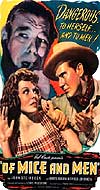 Thousands
of films have taken their genesis from existing books, plays, short stories,
and tales including John Cromwell's Of Human Bondage
(1934) (based on W. Somerset Maugham's classic novel) about how tarty
waitress Bette Davis ruined the life of Leslie Howard, Of Mice and Men
(1939 and 1992) (an adaptation of the classic John Steinbeck tragedy),
George Stevens' A Place in the Sun (1951) (an
adaptation of Theodore Dreiser's An American Tragedy) about the end
of an idyllic relationship between Montgomery Clift and beautiful debutante
Elizabeth Taylor due to his false conviction for murdering his pregnant girlfriend
Shelley Winters, Robert Ellis Miller's The Heart is a Lonely Hunter (1968) (from Carson McCullers' novel) with Alan Arkin as a deaf mute, (from Tennessee
Williams' works), or Delbert Mann's Marty (1955) (from Paddy Chayefsky's writings) about a middle-aged Italian butcher (Ernest
Borgnine) offered his last chance at love. Thousands
of films have taken their genesis from existing books, plays, short stories,
and tales including John Cromwell's Of Human Bondage
(1934) (based on W. Somerset Maugham's classic novel) about how tarty
waitress Bette Davis ruined the life of Leslie Howard, Of Mice and Men
(1939 and 1992) (an adaptation of the classic John Steinbeck tragedy),
George Stevens' A Place in the Sun (1951) (an
adaptation of Theodore Dreiser's An American Tragedy) about the end
of an idyllic relationship between Montgomery Clift and beautiful debutante
Elizabeth Taylor due to his false conviction for murdering his pregnant girlfriend
Shelley Winters, Robert Ellis Miller's The Heart is a Lonely Hunter (1968) (from Carson McCullers' novel) with Alan Arkin as a deaf mute, (from Tennessee
Williams' works), or Delbert Mann's Marty (1955) (from Paddy Chayefsky's writings) about a middle-aged Italian butcher (Ernest
Borgnine) offered his last chance at love.
 Lewis
Milestone's realistic anti-war drama All Quiet on the Western Front (1930) was based on the pacifistic
novel of the same title by Erich Maria Remarque. Director John Huston's final
film brought together an all-Irish cast to dramatize James Joyce's short story The Dead (1987) about a Christmas get-together in Dublin. The influential
American film about an alienated college graduate who was further educated
by Mrs. Robinson's exploitative seduction, Mike Nichols' The Graduate (1967) was based on the novel by Charles Webb. The
award-winning British film The Remains of the Day (1993) was adapted
by Ruth Prawer from the novel by Kazuo Ishiguro. Tom Wolfe's 1999 non-fictional,
best-selling book about seven USAF test pilots who wanted to 'beat' the "demon
that lived in the air" (the sound barrier) and trained to be Mercury astronauts at the start of the US space program was adapted for Philip Kaufman's The Right Stuff (1983). It was released at the time of the real-life
astronaut John Glenn's run for the presidency, although it flopped at the
box-office. Lewis
Milestone's realistic anti-war drama All Quiet on the Western Front (1930) was based on the pacifistic
novel of the same title by Erich Maria Remarque. Director John Huston's final
film brought together an all-Irish cast to dramatize James Joyce's short story The Dead (1987) about a Christmas get-together in Dublin. The influential
American film about an alienated college graduate who was further educated
by Mrs. Robinson's exploitative seduction, Mike Nichols' The Graduate (1967) was based on the novel by Charles Webb. The
award-winning British film The Remains of the Day (1993) was adapted
by Ruth Prawer from the novel by Kazuo Ishiguro. Tom Wolfe's 1999 non-fictional,
best-selling book about seven USAF test pilots who wanted to 'beat' the "demon
that lived in the air" (the sound barrier) and trained to be Mercury astronauts at the start of the US space program was adapted for Philip Kaufman's The Right Stuff (1983). It was released at the time of the real-life
astronaut John Glenn's run for the presidency, although it flopped at the
box-office.
Tennessee Williams' Adaptations:
There are numerous works adapted from American playwright
Tennessee Williams' works. Invariably, the often melodramatic films are set
in the South or have Southern characters, and they usually involve scandalous
sexual conflicts. However, most of Williams' writings were adapted for the
screen when the Production Code was still in effect, therefore bowdlerizing
much of the content:
- Irving Rapper's The Glass Menagerie (1950) about
a family in New Orleans
- Elia Kazan's A Streetcar Named Desire (1951) with Marlon Brando as the inimitable
Stanley Kowalski, and Vivien Leigh as a fragile Southern belle
- Daniel Mann's The Rose Tattoo (1955) with Burt Lancaster
as an Italian-American truck driver and Anna Magnani as the Italian widow
he romances
- Elia Kazan's Baby Doll (1956) with Carroll Baker as the corruptible, thumb-sucking child bride who refuses
to make love to her husband and cotton-gin owner Karl Malden
- Richard Brooks' Cat on a Hot Tin
Roof (1958) with Paul Newman as an ex-football star and sanitized
homosexual and Elizabeth Taylor as his horny, unsatisfied wife, Maggie the
Cat
- Joseph L. Mankiewicz' lurid Suddenly,
Last Summer (1959) with a lobotomy-threatened, over-ripe Elizabeth
Taylor and her imperious, matriarchal aunt Katharine Hepburn
- Sidney Lumet's The Fugitive Kind (1959) with Marlon
Brando as a ex-criminal drifter in a rural Mississippi town
- Jose Quintero's The Roman Spring of Mrs. Stone (1961) with Vivien Leigh as a declining, middle-aged actress-widow and a young
Warren Beatty as her Italian gigolo
- Peter Glenville's Summer and Smoke (1961) starring
Geraldine Page and Laurence Harvey
- George Roy Hill's Period of Adjustment (1962) about
two troubled married couples, one of whom includes a young Jane Fonda
- Richard Brooks' Sweet Bird of Youth (1962) with
Paul Newman as a studly hustler and lover of faded, self-destructive movie
star Geraldine Page
- John Huston's The Night of the Iguana (1964) with
Richard Burton as a tortured, defrocked clergyman and a cast of characters
in a rundown Mexican hotel run by an oversexed Ava Gardner
- Sydney Pollack's This Property is Condemned (1966) with Natalie Wood and Robert Redford in an ill-fated relationship
|
